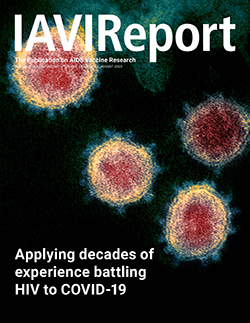August 4, 2020
IAVI REPORT – VOL. 24, NO. 1, 2020
Kristen Jill Kresge
 When Bill Gates delivered a TED talk in 2015, he warned that the world was not ready for the next pandemic. Many others have issued similar warnings, some on the pages of this publication. Vanity Fair recently referred to Gates, Mike Osterholm, and Seth Berkley (see Finding a global solution for a global problem), among others, as “Coronavirus Cassandras,” and asked why the world didn’t heed their warnings.
When Bill Gates delivered a TED talk in 2015, he warned that the world was not ready for the next pandemic. Many others have issued similar warnings, some on the pages of this publication. Vanity Fair recently referred to Gates, Mike Osterholm, and Seth Berkley (see Finding a global solution for a global problem), among others, as “Coronavirus Cassandras,” and asked why the world didn’t heed their warnings.
But while it certainly does seem that the world was unprepared from a public health perspective, scientists were ready. Within days—hours even—scientists around the world shifted their focus to combatting COVID-19. The genetic sequence of the new coronavirus was published within two weeks of when the first cases emerged, setting off a race to develop vaccines and therapies. And now, seven months later, there are 139 vaccine candidates in preclinical development and 26 already in clinical trials. There are also dozens of monoclonal antibodies to SARS-CoV-2 in development for both treatment and prevention, as well as numerous other diagnostics and novel and re-purposed therapeutics. The scientific understanding of this new virus is unfolding at an unprecedented pace.
Many of the scientists contributing to these efforts have honed the technologies and expertise being applied to COVID-19 in their decades-long quest to thwart HIV. In this issue, we focus on some of the critical contributions that HIV researchers are making in both vaccine and monoclonal antibody development (see The race is on and Monoclonal antibodies and their potential role in combatting COVID-19). We also talk with Seth Berkley, chief executive officer of Gavi, the Vaccine Alliance, about their efforts to ensure equitable global access to eventual COVID-19 vaccines (see Finding a global solution for a global problem), as well as investigate how many experts are urging the world to prepare now for the next pandemic, even as this one continues to unfold (see In the midst of a pandemic and preparing for the next).
I recognize that there is no shortage of reading material, scientific or otherwise, on COVID-19. But my hope is that this issue emphasizes how the impressively rapid scientific response to this novel pathogen was facilitated by the investment and innovation in HIV and other viruses that remain global public health burdens. I also hope it makes the case for continuing basic research and vaccine development efforts so we can win the battle against all microbes. To quote a blog post by Max Roser of the University of Oxford and founder and director of Our World in Data, “our best hope is science.”
We all hope that this collective scientific effort will bring this pandemic, which has now taken the lives of nearly 700,000 people, to an end as quickly and definitively as possible. If science is our best hope, we are in good hands.